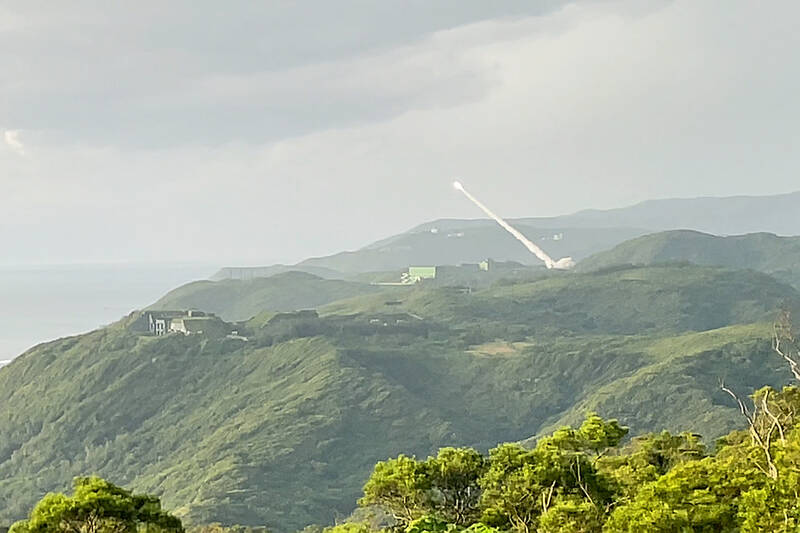Taiwan is to build 12 new indigenous Tien Kung or Sky Bow III (TK III) land-based surface-to-air missile sites by the end of 2026 to counter the threat of China’s ballistic missiles, according to a Ministry of National Defense (MND) report.
The report, sent to the Legislative Yuan on Oct. 20 for a defense budget review, said the new sites were needed based on the advice of Taiwan’s top military research unit, the Chungshan Institute of Science and Technology.
It said the institute has found that older generations of TK missiles it built, the TK IIs, could no longer counter the threat of the Chinese People’s Liberation Army’s advanced ballistic missile systems and needed to be modernized.

Photo: Tsai Tsung-hsien, Taipei Times
Consequently, the MND decided to upgrade its existing MIM-23 Hawk missile system sites and TK II missile sites and turn them into 12 new missile sites for the more advanced TK III land-based surface-to-air missiles, the report said.
It did not disclose how many TK III land-based surface-to-air missile sites Taiwan already has around the country.
The first phase of the project, the upgrading of six old missile sites into sites compatible with the TK IIIs, began last year and is expected to be completed before the end of 2025.
Work on the remaining six TK III missile sites began earlier this year and should be completed before the end of 2026, the MND said in the report.
According to the institute’s Web site, the TK III system is designed to engage different threats, including aircraft, cruise, anti-radiation and short-range tactical missiles.
The system can also launch older versions of missiles in the TK family, including TK I and II missiles.
The TK III system is being operated in conjunction with the US-bought PAC system as the backbone of Taiwan’s low-altitude air defense system, the institute said on its Web site.

Taiwan is stepping up plans to create self-sufficient supply chains for combat drones and increase foreign orders from the US to counter China’s numerical superiority, a defense official said on Saturday. Commenting on condition of anonymity, the official said the nation’s armed forces are in agreement with US Admiral Samuel Paparo’s assessment that Taiwan’s military must be prepared to turn the nation’s waters into a “hellscape” for the Chinese People’s Liberation Army (PLA). Paparo, the commander of the US Indo-Pacific Command, reiterated the concept during a Congressional hearing in Washington on Wednesday. He first coined the term in a security conference last

A magnitude 4.3 earthquake struck eastern Taiwan's Hualien County at 8:31am today, according to the Central Weather Administration (CWA). The epicenter of the temblor was located in Hualien County, about 70.3 kilometers south southwest of Hualien County Hall, at a depth of 23.2km, according to the administration. There were no immediate reports of damage resulting from the quake. The earthquake's intensity, which gauges the actual effect of a temblor, was highest in Taitung County, where it measured 3 on Taiwan's 7-tier intensity scale. The quake also measured an intensity of 2 in Hualien and Nantou counties, the CWA said.

The Overseas Community Affairs Council (OCAC) yesterday announced a fundraising campaign to support survivors of the magnitude 7.7 earthquake that struck Myanmar on March 28, with two prayer events scheduled in Taipei and Taichung later this week. “While initial rescue operations have concluded [in Myanmar], many survivors are now facing increasingly difficult living conditions,” OCAC Minister Hsu Chia-ching (徐佳青) told a news conference in Taipei. The fundraising campaign, which runs through May 31, is focused on supporting the reconstruction of damaged overseas compatriot schools, assisting students from Myanmar in Taiwan, and providing essential items, such as drinking water, food and medical supplies,

Prosecutors today declined to say who was questioned regarding alleged forgery on petitions to recall Democratic Progressive Party (DPP) legislators, after Chinese-language media earlier reported that members of the Chinese Nationalist Party (KMT) Youth League were brought in for questioning. The Ministry of Justice Investigation Bureau confirmed that two people had been questioned, but did not disclose any further information about the ongoing investigation. KMT Youth League members Lee Hsiao-liang (李孝亮) and Liu Szu-yin (劉思吟) — who are leading the effort to recall DPP caucus chief executive Rosalia Wu (吳思瑤) and Legislator Wu Pei-yi (吳沛憶) — both posted on Facebook saying: “I